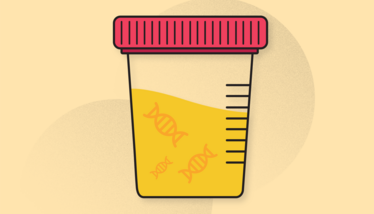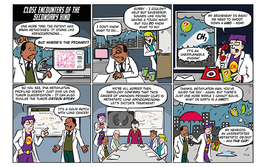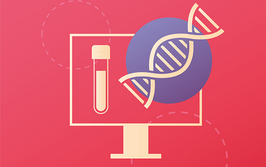Combining Urine Biomarkers for Prostate Cancer
A new multi-marker test could be a less invasive and more accurate way to detect prostate cancer
Prostate cancer is the second most common cancer in men across the globe – but it is also one of the most overdiagnosed. Prostate cancer diagnosis typically involves blood tests – in particular, the well-known and much-debated prostate-specific antigen (PSA) – as well as digital rectal examination and biopsy. However, as many as 60 percent of patients who have a raised PSA level don’t have prostate cancer. Shea Connell and a team from the University of East Anglia have been working to reduce these unnecessary biopsies by creating a more accurate urine biomarker test.
“PSA is a good indicator that something might be wrong, but it’s not specific enough for accurate clinical use,” explains Connell. “Although most prostate cancer patients will have elevated serum PSA levels, so do patients with benign conditions, infections, or a range of other conditions.” Connell and colleagues, who recently developed a urine test that predicts aggressive prostate cancer up to five years earlier than standard clinical methods (1), have now investigated the use of extracellular vesicles and genetic methylation levels as urine markers for the disease.
The result? A new test called ExoMeth that integrates circulating free DNA, cellular methylation, and clinical factors. In a study testing urine samples from 197 patients, Connell says, “We closely monitored hypermethylation of six genes: GSTP1, APC, SFRP2, IGFBP3, IGFBP7, and PTGS2. None are accurate for individual use – but by combining them with several well-documented urine biomarkers, we can accurately predict the presence of aggressive prostate cancer (2).”
Once fully validated, Connell sees the multivariable risk model having a great impact. “Our ultimate goal is to facilitate home testing for patients with suspected prostate cancer. This would provide a means of triage before having to visit a specialist at hospital, avoiding those biopsies that ultimately prove unnecessary.” So far, the approach shows promise; according to the paper, ExoMeth offers a net benefit over current standards of care and could reduce unnecessary biopsies by up to 66 percent.

- M Webb et al., Biotechniques, 68, 65 (2020). PMID: 31779479.
- Connell et al., The Prostate, 80, 547–558 (2020). PMID: 32153047.
While completing my undergraduate degree in Biology, I soon discovered that my passion and strength was for writing about science rather than working in the lab. My master’s degree in Science Communication allowed me to develop my science writing skills and I was lucky enough to come to Texere Publishing straight from University. Here I am given the opportunity to write about cutting edge research and engage with leading scientists, while also being part of a fantastic team!




















